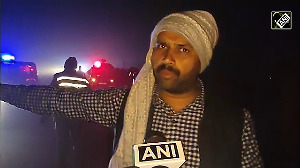 As Satyajit Ray's classic Pather Panchali creates a stir at Cannes 50 years after it was released, it's a good time to catch up with one of his leading men.
As Satyajit Ray's classic Pather Panchali creates a stir at Cannes 50 years after it was released, it's a good time to catch up with one of his leading men.
Dhritiman Chatterjee starred in Ray's 1972 masterpiece, Pratidwandi. While he did not give up the advertising profession, Chatterjee continued to appear in films that appealed to him, which includes working with Ray for the next two decades.
Recently, the actor also played Rani Mukerji's father in Sanjay Leela Bhansali's Black.
In a candid chat with Raja Sen, Sundar -- as friends fondly call Chatterjee -- recalls working with the master filmmaker, Ray. Excerpts:
You were at HTA (advertising agency Hindustan Thompson Associates, now called J Walter Thompson) before you switched to films. How did that happen?
Actually, I entered cinema just before I entered HTA. I always had an active interest in cinema, and it was reaching a great peak then. I'm talking about the 1960s here.
I would devour films, largely Indian and French. Some friends formed one of India's first true film societies, to fan our own enthusiasm. In this exciting process, we contacted people like (Satyajit) Ray and Mrinalda (Sen). Establishing this contact was, in itself, a huge thrill.
Was it easy to get in touch with Ray?
Of course! (Laughs) Not really 'easy', but directors then were relatively (more) approachable.
In Ray's case, while he was casting for Pratidwandi, a close friend of mine threw us together. Without any warning, he decided to cast me!
Were you prepared for acting? Or was it the unexpected launch of an acting career?
![]()
Ray on rediff.com!
![]()
![]()
![]()
![]()
My father, Satyajit Ray![]()
Restoring Ray![]()
Cannes: complete coverage![]()
![]()
![]()
It was exciting, yes, but I wouldn't really call it the launch of an acting career. To me, most of the excitement was not in being in front of the camera, but in the joy of watching Ray work. From extremely close quarters! It was great.
But you weren't an actor. Wasn't it unnerving acting as a leading man with, of all people, a director like Ray?
The thing about Ray was that, in more cases than not, he wrote (roles) for specific actors. This was something that certainly made things easier. (Laughs) Also, the film was about a life I knew (The film is about a young man and his life in a world of political unrest).
And I was still excited at observing the way he worked. Pratidwandi marked a style change for him -- a lot of handheld camera, and shooting in the streets.
 Was he a very exacting director? Would he give strict instructions to his actors, or did he encourage improvisation?
Was he a very exacting director? Would he give strict instructions to his actors, or did he encourage improvisation?
Good question. Frankly, with me he said -- for whatever reason -- I should do just as I wanted. And that was always there. But I don't think that was his 'method' really. I've seen him being very specific with his actors.
What about his script? Did he work from a very tight script and storyboard, or did he usually listen to suggestions?
Yes and no. His script was very important to him. He did a lot of background research before writing a script. For example, in his last film (Agantuk, in 1991), where I had a small role, he had been reading a lot about French anthropologist (Claude) Levi-Strauss, which sensibly made its way into the film.
But, primarily, no. Ray did it all, and it was unbelievable. The screenplay, the music, the editing -- each aspect of the filmmaking process was taken care of by him personally. He even chose the material for the clothes! It's just admirable.
So even as you worked so brilliantly in Pratidwandi, acting was never your day job.
Yes. I continued to act, on and off, since Pratidwandi, collaborating with people and scripts I admired. I worked with people like Mrinalda and Aparna (Sen, the director of 36, Chowringhee Lane and Mr & Mrs Iyer). But acting was just one of the things I did.
Advertising always excited me. So I did both, and it was fun as long as the work got delivered. It was burdensome at times -- for example, I'd get to shoot for films only at night, because of office in the day -- but great fun!
 I think I enjoyed acting more because I was never trying to build a career, or become a 'star.' I love acting -- be it films, advertisements, documentaries, educational features.
I think I enjoyed acting more because I was never trying to build a career, or become a 'star.' I love acting -- be it films, advertisements, documentaries, educational features.
Which roles would you call your acting challenges?
I'd say Ray's last three films (Ganashatru, Shakha Prashakha and Agantuk), which he made after a severe, prolonged illness.
In Ganashatru, which was his version of (Norwegian playwright Henrik) Ibsen's Enemy Of The State, it was a difficult role because I played a negative character for the first time.
Then again, I was a bit of a b*****d (laughs) in 36, Chowringhee Lane (1981), just before that. But Ganashatru was as negative as it gets, which was quite a challenge.
And (director of Bengali art-house films) Ashok Vishwanathan made a film called Sunya Theke Suru in 1993, when I really had a tough time. My character was of an academic, who joins Left-wing extremists, is jailed and forgotten. He goes through insanity and rehabilitation.
The deranged part of it was quite torturous -- I had to roam the streets of (Kolkata's) Sealdah in filthy rags!





